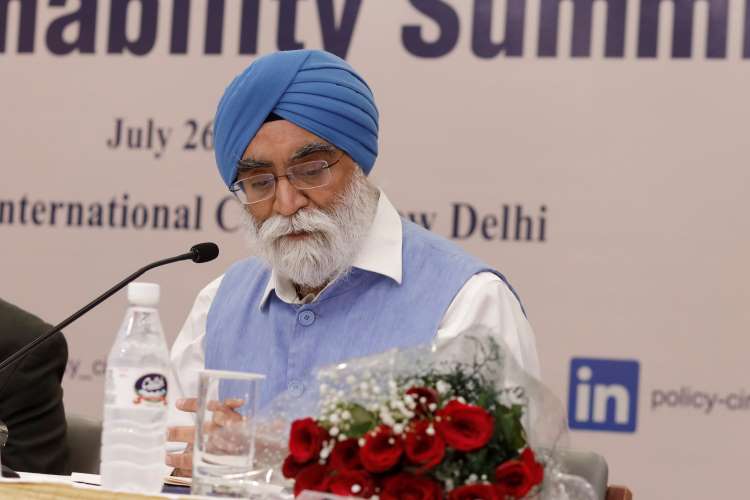
As a student of Economics, I find myself reflecting upon the complexities of sustainability in the context of this conference, with its illustrious speakers and discussions. The crux of the matter lies in defining sustainability itself. For the longest time, I, like my fellow economists, associated it with steady growth, a notion encapsulated within a life cycle of 20 to 30 years. As an exemplar, we often pointed to China’s unprecedented 10% growth sustained over three decades. However, my perspective underwent a profound transformation during my tenure at the IMF, where I had the opportunity to engage with Middle Eastern countries.
It was an era when oil prices soared to $140 per barrel, a stark contrast to its long-term average of approximately $15 per barrel over a century. I questioned these nations about their actions during such extraordinary price surges, events not unprecedented in history, like the early 1970s when the dollar detached from the gold standard. Their response was nothing short of illuminating. They reminded me that the oil beneath the soil existed due to the efforts of countless generations before, and its ownership extended beyond the present to the next hundred generations.
READ I Balancing act: RBI navigates global challenges with confidence
Intergenerational equity and sustainability
This idea of intergenerational equity, whereby the benefits of resources transcend current times, struck a chord with me. It made me realize that sustainability entails stewarding our assets responsibly for the well-being of posterity. Introducing the concept of sustainability beyond a few decades to thousands of years, these experiences challenged conventional thinking among economists, myself included. It led me to contemplate the plight of assets, many of which are severely polluting. Transition funds to replace such assets are essential, but the question arises: who bears this responsibility?
The issue of accountability echoes through our discussions—consumers who demand potentially harmful products, or producers driven by profit motives? Industries face debates about continuity versus change, prompting reflections on the role of public transport versus private transport and the historical impact of General Motors’ combustion engine on climate change.
Patents, too, raise questions about sustainability—when permitted, did we ever consider its implications for generations to come? Western growth models, while resource-rich, have gaps that demand scrutiny and correction. The dialogue now involves not just industry versus industry but also industry versus agriculture, given the environmental impact of various agricultural practices. Fiscal policy has thus far borne the brunt of addressing sustainability, while other policies like monetary, industrial, and trade are catching up.
As an Indian, I take pride in our country’s ancient model of sustainable growth, which emphasizes harmonious living and optimal resource utilisation. India’s G20 presidency provides a unique platform to showcase an alternative model of economic growth—one that strives to transition from highly polluting assets to cleaner alternatives. While promises of financial support have been made, actual funds to drive these transitions have yet to materialize fully. The financial sector’s role in supporting sustainability must be explored further.
Drawing inspiration from India’s ancient wisdom, I firmly believe that we can inject a philosophical bearing into global discussions on sustainability. Harmonious living, devoid of resource exploitation, and guided by ethical standards, can pave the way for a brighter future for the planet and its inhabitants. As we deliberate further in the upcoming session, I aim to explore the role of the financial and monetary sectors in fostering sustainable practices. Together, we can forge a path towards a more equitable and sustainable world for generations to come. Thank you for your attention.
This conference has raised some profound questions on the intricacies of sustainable growth and its intergenerational implications. Shifting our perspective from short-term cycles to encompass thousands of years, we must recognise that our actions today reverberate through the ages, impacting the prosperity of future generations.
West Asian nations’ insightful reminder that oil is family wealth, belonging to both the present and the next hundred generations, underscores the gravity of our responsibility as custodians of the planet’s resources. We stand at a critical juncture where our choices determine the legacy we leave behind—a legacy of either heedless exploitation or thoughtful stewardship.
As we delve into the complexity of sustainability, we must heed the wisdom of ancient Indian traditions that emphasise harmonious coexistence with nature and optimal resource utilisation. By embracing circular economies and ethical standards, we can demonstrate an alternate growth model to the resource-rich West, one that prioritises the well-being of the planet and future generations.
The time has come to bridge the gap between rhetoric and action, to mobilise transition funds, and to hold all stakeholders accountable in their pursuit of a sustainable future. In doing so, we can transform the narrative of growth and development, steering it towards a path that embraces the 3Ps—People, Planet, and Profit—propelling us towards a world where prosperity thrives alongside environmental preservation and social harmony. Together, we embark on this collective endeavour to create a sustainable and equitable future for all.
Dr Charan Sigh is a Delhi-based economist. He is the chief executive of EGROW Foundation, a Noida-based think tank, and former Non Executive Chairman of Punjab & Sind Bank. He has served as RBI Chair professor at the Indian Institute of Management, Bangalore.

